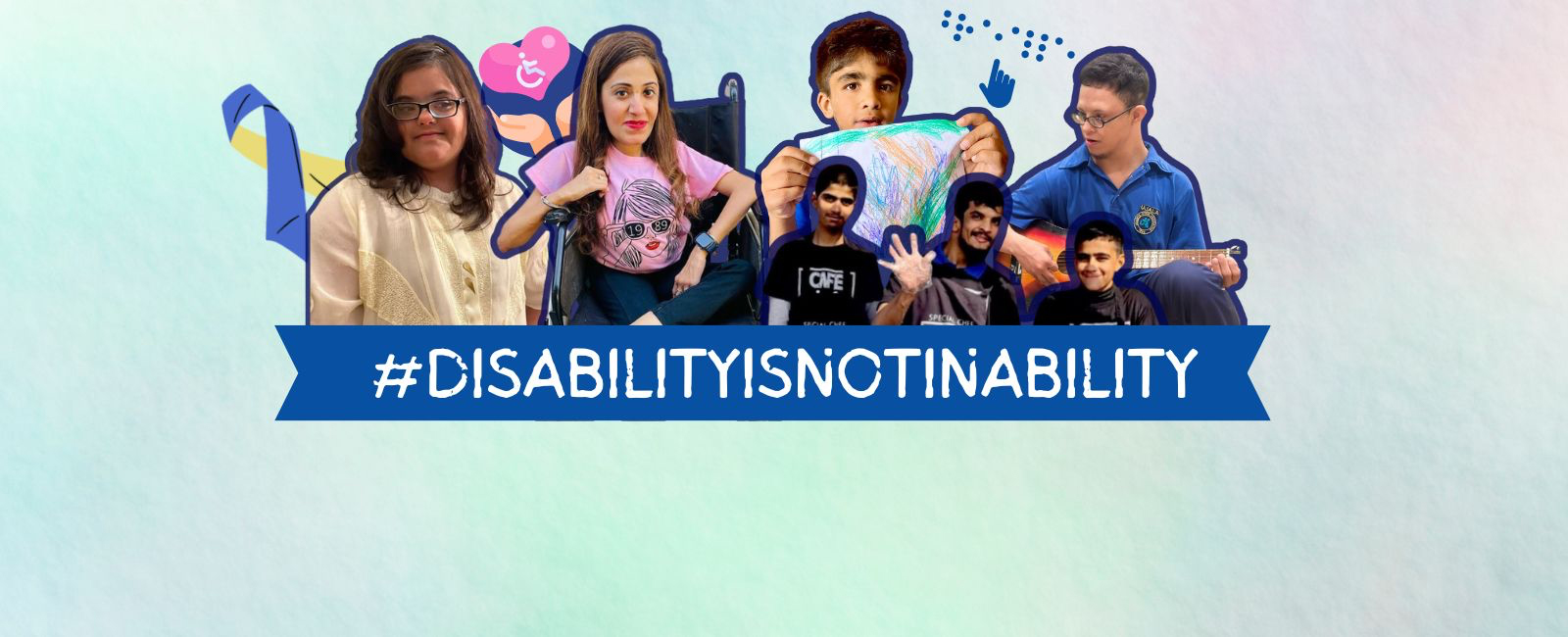Ability in disability: Are we doing our bit to empower people with special needs in Pakistan?
Let's build a society where everyone, regardless of ability, is treated as normal and allowed to live a full life

As Najla, 21, who suffers from Down’s syndrome, grew older, social discrimination became glaringly evident to her and her family as among all other heartbreaking reactions of educated and uneducated people alike, she was also denied enrollment in schools because of her special needs.
The daily inquisition she faced almost everywhere forced her to withdraw more and more from public life and deeper and deeper into isolation.
Najla's educational journey was fraught with daunting challenges.
Despite having options in Karachi, she tried her luck in Lahore but to no avail, as her challenges did not change leading to changing schools multiple times.
"Society's attitudes matter a lot,” said Najla’s mother, Dr Sajeela Haroon, who has been caring for her daughter since birth.
Speaking with Geo.tv, Dr Sajeela said her daughter refused to go to school when she was in eighth grade. “She felt people's stares burning into her. She heard other kids mocking her and most disappointingly she also saw some insensitive teachers making fun of her because of her condition instead of making her feel understood and protected".
Nalja loved shopping but stopped doing that as well, spending most of her days isolated from the world. Even her favourite activity became a source of distress because she could feel people looking at her differently. Recognising the impact on her confidence, her mother encouraged her to face the world, determined to convince her she had the strength to do it.
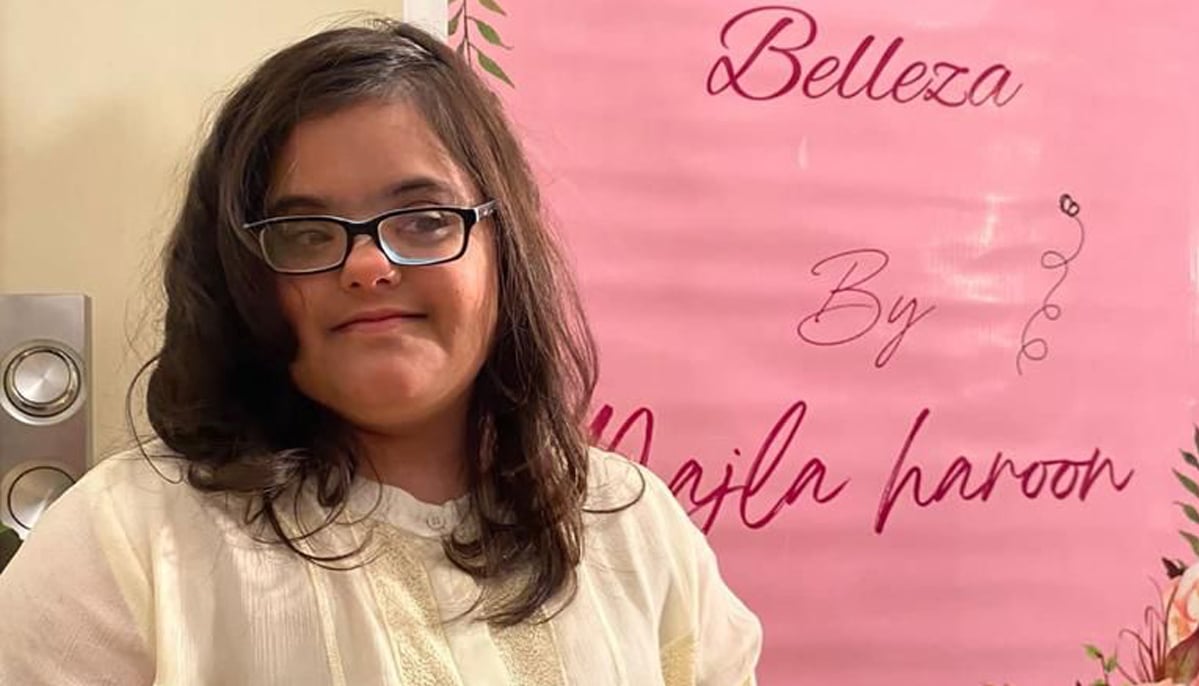
With the collective support of her counsellors and mother, Najla discovered in herself a talent and refined it, allowing her to carve out something uniquely hers. Her creative journey began with block printing on bed sheets, while the overwhelming love for her designs prompted her to expand into apparel, leading Najla to start her brand, Belleze. This venture provided the young woman with a creative outlet and empowered her, instilling the confidence to face the world bravely.
Individuals living with genetic disorders like Down's syndrome or Edwards syndrome — which causes severe disability among babies born with it — require immense care and attention.
Zehra Tanweer Sabir — an educational coordinator at the Parents Voice Association - Ujala Centre, a school and vocational training centre for individuals with disabilities — told Geo.tv that her organisation had taken a stand to empower individuals with Down's syndrome to equip them with social skills and excel in tasks requiring commitment to instructions.
"Through the skills, these individuals are offered academic knowledge, exposure through internships and skills training with focus on block printing, cooking, art, music, computers, and grooming. We also ensure therapy to enhance communication and behavioural skills. The goal is to integrate them into diverse careers, and our ongoing efforts involve exploring job opportunities," she said.
Najla's mother, too, highlights the immense potential within each such individual citing about witnessing her own daughter's transformation.
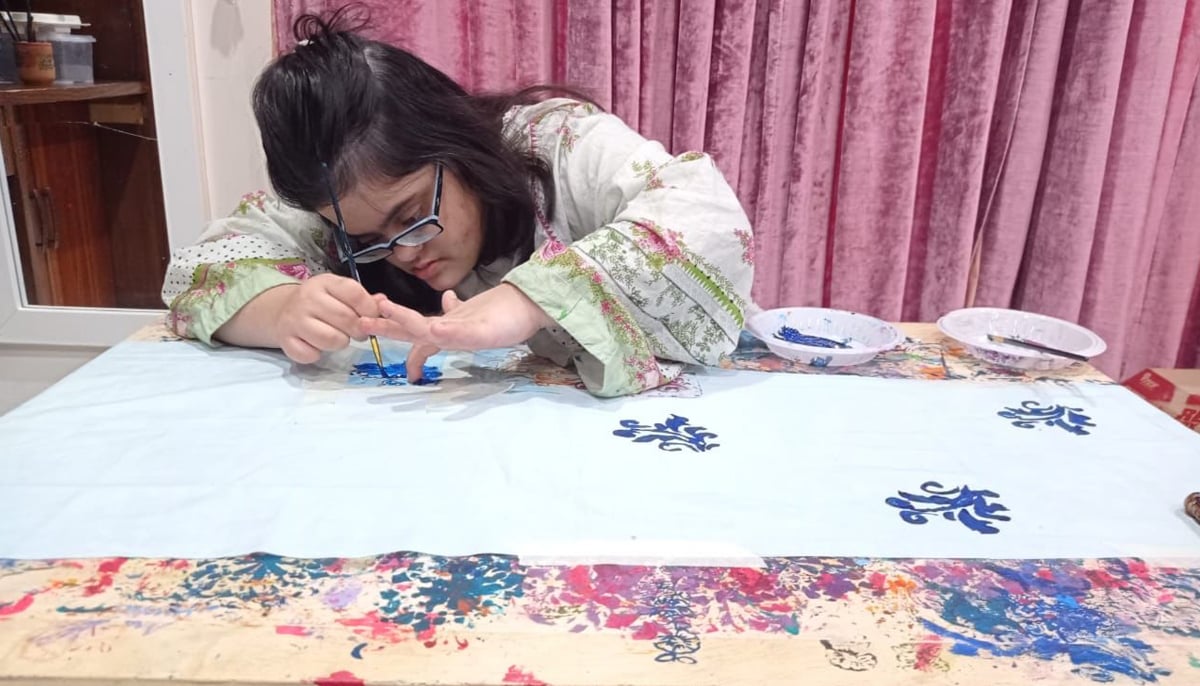
"Society's attitude can evolve when we embrace empathy and raise awareness about our children's and individuals' unique capabilities. It's a collective effort to foster a more inclusive and understanding community," Dr Sajeela said.
Transforming lives of persons with disability
For people with disabilities, empathy goes beyond sympathy. It requires recognising their struggles, triumphs, aspirations and fostering a connection that transcends physical or cognitive differences.
The 32-year-old Amna Raheel, who has navigated life with muscular dystrophy, a genetic condition diagnosed as polio during her childhood in Pakistan, also faced a similar ordeal.
Amna — who works at a multinational company — in an interview with Geo.tv, recognised the pervasive discrimination and lack of equal opportunities faced by people with disabilities, but also the importance of raising one's voice against the injustice faced by such individuals.
To cope with the challenges, she founded Dismatched, an Instagram-based transformative initiative for people with visible and invisible disabilities. Motivated by her journey of navigating life's challenges without adequate guidance, Amna envisioned a community that could collectively share insights and provide mutual support. In a remarkably short period, Dismatched evolved into a robust family comprising 200 individuals who contribute to fostering an environment of understanding and encouragement.
Speaking about her initiative, Amna said: "We come together, discussing our daily experiences, motivating each other not to give up on our dreams, and, fundamentally, offering unwavering support regardless of our diverse backgrounds."
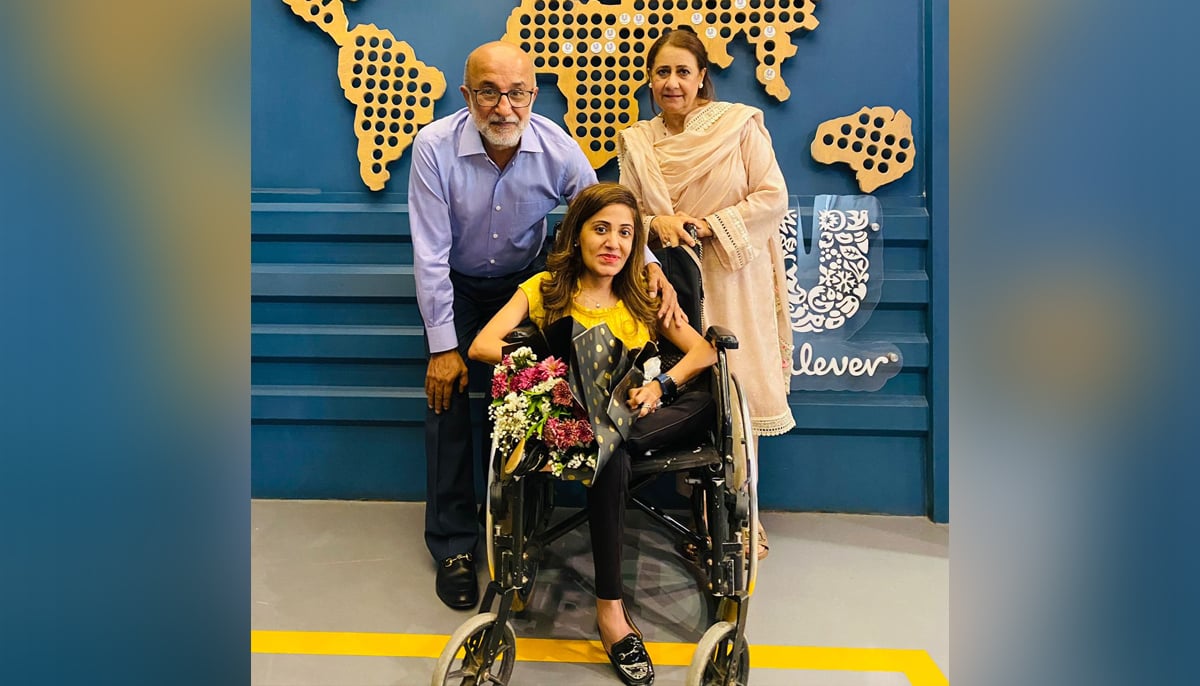
"Being understood is all a human needs and that, in itself, is a beautiful feeling," she added.
Beyond the professional world, the young founder points towards the inadequacies of the city's infrastructure, particularly in public places. One of the many incidents where Amna faced discrimination was denied access to a prayer area because of her wheelchair illustrates the pressing need for inclusive infrastructural designs in public spaces.
People like Najla and Amna, who live with disabilities, face significant challenges in trying to engage in routine activities such as going to work or school, socialising with loved ones, attending cultural events, going shopping or attending medical appointments.
Inaccessible buildings or structures and public transit woes are challenging for their mobility and participation in society. Whether it's dealing with bus drivers, physicians at hospitals, or state-employed social workers, people with disabilities face prejudice and stigma every day. Public measures claiming to be in their favour perpetuate discrimination and stigma.
Discrimination in healthcare is another obstacle that people with disabilities are confronted with as part of their everyday experiences, which include a lack of accurate and comprehensive information about treatments and available alternatives and disregard of their informed permission before treatment.
Living with retinitis pigmentosa
Erril Hussain, a 26-year-old visually impaired trainer at the Network of Organisations Working For People With Disabilities Pakistan (NOWPDP), was born with retinitis pigmentosa, a condition also known as night blindness.
Recalling his conversation with a 50-year-old visually impaired student who learned to use a cell phone after years of isolation, Erril said they both spoke about the "fake hope" doctors gave their patients.
He added that doctors in our society worked on hope and said words like "hopefully this medicine will work" or "hopefully this treatment will bring your sight back".
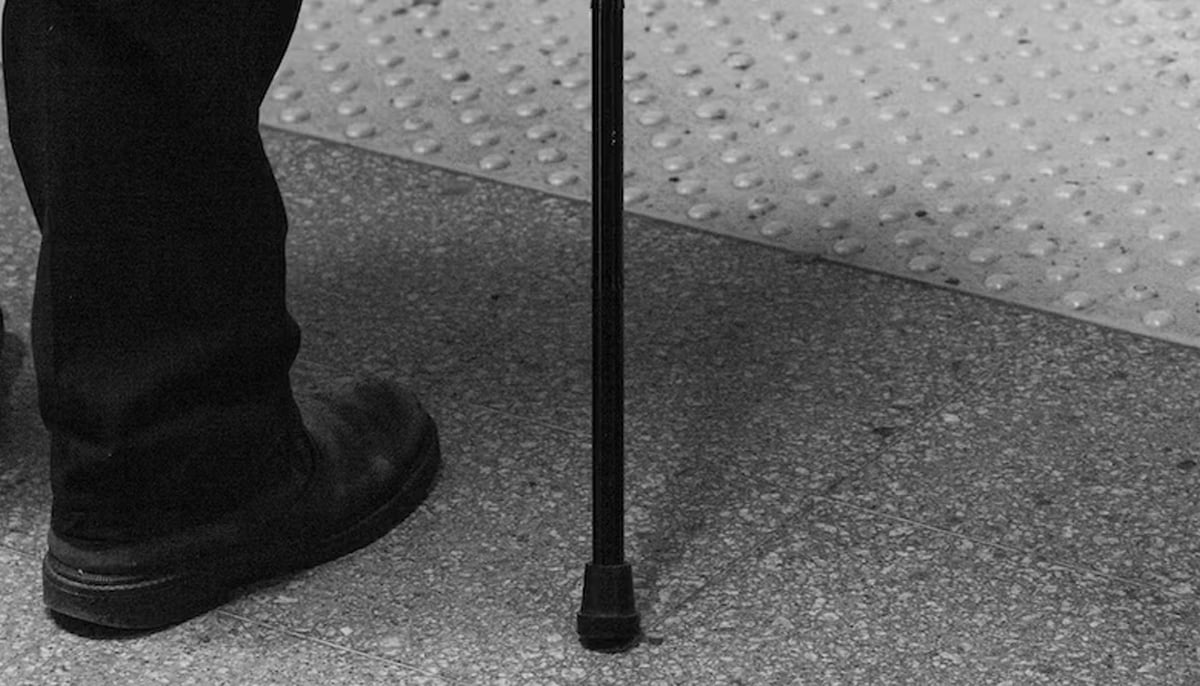
"For 50 years, a student of mine kept living on hope his doctor gave him because the doctor himself wasn't aware of his patient's condition ultimately," he shared, speaking to Geo.tv.
Erril Hussain's workplace, according to him, has been accommodating. He familiarised himself with its infrastructure within a month, which adheres to guidelines for people with disabilities. The managerial attitude is supportive, seeks their input and ensures comfort, he said.
"Pakistani society needs significant improvements. Some stigmas and assumptions need to be dispelled. Bringing an end to the belief that spending time with a person with a disability can influence your child's health is crucial," said Erril, shedding light on addressing the many myths that continue to perpetuate in society.
He also underlined the need to stop mistaking a disabled person with someone who was "poor" in any way.
"If I ask someone to help me take a bus, seeing a cane in my hand, they would hand me some money. I'm not a beggar, I just need to get on the bus," he added.
'True freedom is not just physical'
Ayesha Elahi, Associate Programs Rehnumai at NOWPDP, believes that people with disabilities deserve acceptance, not alienation, to foster awareness and inclusivity.
To achieve the goal of freedom and independence for people with disability — cultural and emotional accessibility play pivotal roles. Ayesha emphasises that it's not just about ramps and accommodations, but reshaping societal attitudes. She insisted that people with disabilities should be accepted wholeheartedly, not treated as outsiders or anomalies.
"True freedom is not just physical. It is the freedom to be accepted as we are, without the weight of stereotypes. Let us break the chains of difference and create a culture where everyone, regardless of abilities, is seen for their capabilities, not limitations," she added, highlighting that their initiative goes beyond conventional approaches by hosting training sessions before teaming up with other companies for job placements.
There shouldn't be an argument on the fact that people with disabilities should get the same opportunities as everyone else to fully participate in community life and live independently with dignity. It includes access to services and technologies to support them.
Services must be tailored to meet the unique needs of individuals with disabilities. Some may require special accommodations such as motorised wheelchairs or elevators in public places, while others may need help with getting dressed, taking a bath or making meals, among other routine activities. All of this falls under the umbrella of personal assistance.
Meanwhile, for many, access to non-state services may be impossible without social safety programmes such as disability payments. Receiving the best healthcare including rehabilitation and disability-specific treatments is also a crucial right for persons with disabilities, while awareness towards disabilities is required at all levels of society.
Challenges in disability data collection
According to the United Nations Development Programme (UNDP) data from 2022, approximately 6.2% of Pakistanis are reported to have a disability, yet the fundamental challenge in inclusivity activism lies in the structurally flawed data collection for the national census. Considering the aforementioned data, Pakistan's population comprises at least 14 million disabled people — unemployed, discriminated against and unhappy.
This is reflected in the data gathered at the local level. The Pakistan Bureau of Statistics (PBS) documented a significantly lower figure with approximately 371,833 individuals identified as disabled in 2020. This discrepancy, therefore, highlights the critical need for a more accurate and comprehensive approach to data collection, further underscoring the actual prevalence of disabilities within the population.
The challenge cited above worsens about disabled people residing in rural areas who already lack the means to improve their situation, acquire new abilities and contribute to their education, so that they can contribute meaningfully to society. Resultantly, they remain confined to their homes where they are lonely, neglected, and wretched.
In the global context, data cited by the World Bank and World Health Organisation (WHO) estimated at least 1.3 billion people or 16% of the world's population are living with a disability. It cannot be ruled out that some people may be reluctant to register themselves or their children due to stigma, prejudice, lengthy governmental processes and a lack of knowledge about their rights.
Discriminatory laws and policies
Despite progress in recognising the rights of individuals with disabilities, discriminatory laws and policies persist in Pakistan, posing significant challenges to the well-being and inclusion of this marginalised community.
The existing legal framework in Pakistan often falls short of addressing the diverse needs of individuals with disabilities. Many laws lack specificity and fail to comprehensively cover areas such as education, employment, and public accommodation, leaving individuals with disabilities vulnerable to discrimination.
Public spaces, including government offices, educational institutions, and recreational areas, often lack the necessary accommodations for individuals with disabilities. This includes ramps, accessible restrooms, and adequate signage, preventing equal participation in public life.
Discriminatory practices in the workplace persist despite the legal requirement for equal employment opportunities. Many employers are not adequately equipped to accommodate individuals with disabilities, leading to unequal treatment and limited career prospects.
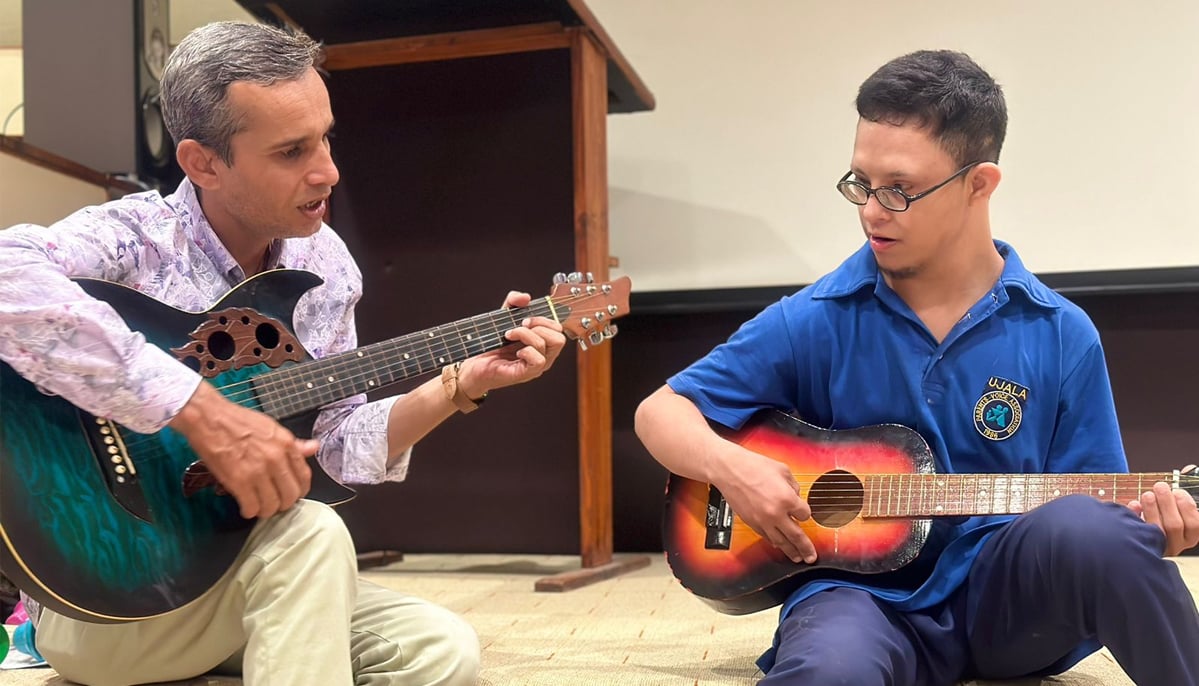
The education sector faces considerable challenges, with inadequate provisions for inclusive education. Many educational institutions lack the infrastructure and support systems necessary for students with disabilities, hindering their right to quality education.
Social security benefits for individuals with disabilities are often insufficient and fail to address the unique needs of this demographic. This creates economic disparities, making it difficult for them to access essential services and live independently.
Some welfare programmes inadvertently perpetuate stereotypes and stigmas associated with disabilities. Such programmes may focus more on charity than empowerment, reinforcing a dependency narrative rather than fostering self-sufficiency.
Embracing flaws among all
Conducting an exhaustive evaluation of laws and regulations is crucial to ensure addressing the rights of person with disabilities, but it is equally important to first ensure redressal of the everyday challenges they face in their lives such as infrastructural inaccessibility and lack of inclusivity and disability bias, among other rights.
Commenting on improving the lives of such individuals, Erril suggested being compassionate and adopting a proactive approach.
"Doctors treating disabilities should avoid giving false hopes, while the private sector needs to be more inclusive. Mass media should also be utilised for discussions on disabilities," he said.
The 23-year-old appreciated the State Bank of Pakistan's 2020 policy for financial inclusion, terming it "commendable", but also insisted that implementation of more such policies must be ensured in the country.
"The government has made strides, but incorporating the private sector is necessary to create practical jobs and accommodate disabled individuals," he added.
There is, undoubtedly, an urgent need to implement a comprehensive strategy addressing the issues of public transit, particularly in rural and distant locations, while all public routes, facilities and buildings should be accessible to individuals with disabilities such as Amna, who wouldn't be refused entry into spaces with her wheelchair.
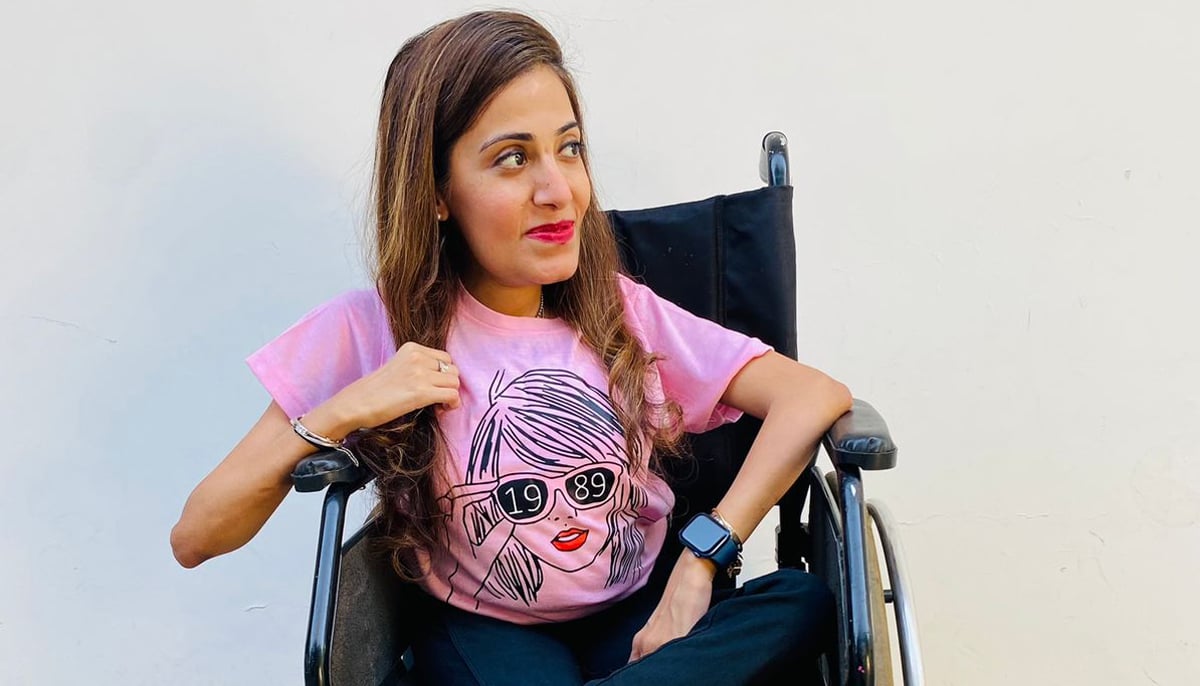
It is equally important to ensure that persons with disabilities have equal access to high-quality medical care with warnings for violators who fail to adhere to accessibility standards or deny accommodations.
Dr Sajeela emphasises changing society's attitude and raising awareness, especially among parents.
Fostering an empathetic attitude towards individuals with disabilities is essential, she added, while government-level initiatives, such as affordable therapy sessions, are also essential.
"Pakistan also needs to take such initiatives so that such kids can develop basic skill sets or get a basic education to live a normal life. There is a significant amount of work that needs to be done," Dr Sajeela maintained.
The need for ensuring redressal of claims about abuse or neglect by employees or home health aides is possible by establishing reliable and impartial monitoring systems and anonymous, readily available channels for filing complaints.
Zehra, on the other hand, envisions a society where individuals with disabilities are accepted and embraced as an integral part of the community.
"My dream is to witness a society where everyone, regardless of ability, is treated as normal and given the opportunity to engage fully in all activities."
Kiran Saeed is a staffer at Geo.tv. She posts @kiransaeed89
Header and banner illustration by Geo.tv



